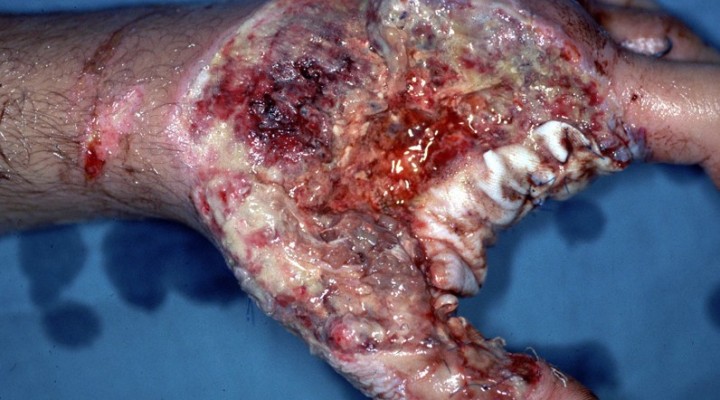Nursing Interventions for Necrotizing Fasciitis
- Identify patients at risk, and report these suspicions to the health care provider
- Vital signs including intake and output, and laboratory data should be carefully observed to monitor for the risk or appearance of sepsis and septic shock.
- Provide frequent dressing changes, wound assessment and documentation, and medication administration.
- Assess the affected area for expansion of the area of erythema, changes or increase in edema, pain, color changes such as a gray appearance beneath the skin, and drainage.
- Administer antibiotics and pain medications as ordered. Broad-spectrum antibiotics may be initiated and then rewritten as culture and sensitivity reports become available.
- Document all medications administered.
- Obtain antibiotic blood levels as ordered.
- Assess their pain using a scale for non-verbal patients. Explain the scale to the patient and instruct the patient to point to the number that best represents his or her current pain level.
- Monitoring vital signs and behavioral changes that may signify greater pain in these patients, such as increased heart rate, increased blood pressure, restlessness, and anxiety, is essential.
- If the assessment indicates pain, prompt administration of analgesia is warranted (as ordered). Morphine sulphate, meperidine, and fentanyl are most commonly used to treat pain in NF patients.
- Work with dieticians to calculate the nutritional requirements based on laboratory values and daily weights since nutritional requirements ranging from two to three times normal amounts with adequate hydration are critical to provide sufficient calories and protein for wound healing.
- Assess the surrounding tissue to see if the fascia can be separated during wound dressing.
- Provide holistic care for NF patients because emotional conditions, such as depression and anxiety disorders, can slow the healing process and lead to poor management of pain
- Encourage realistic expectations for the appearance of skin grafting and reconstructive surgery and realistic goals for the rehabilitation process since patients with NF often require skin grafting after surgical debridement.
- Assess the patient’s support system and pre-surgery coping skills by questioning the patient and family about any pre-existing psychological and psychiatric problems since such a history has been linked to poor adjustment.
- Encourage patients to express their emotions regarding disfigurement, role conflict, and sexual function.






